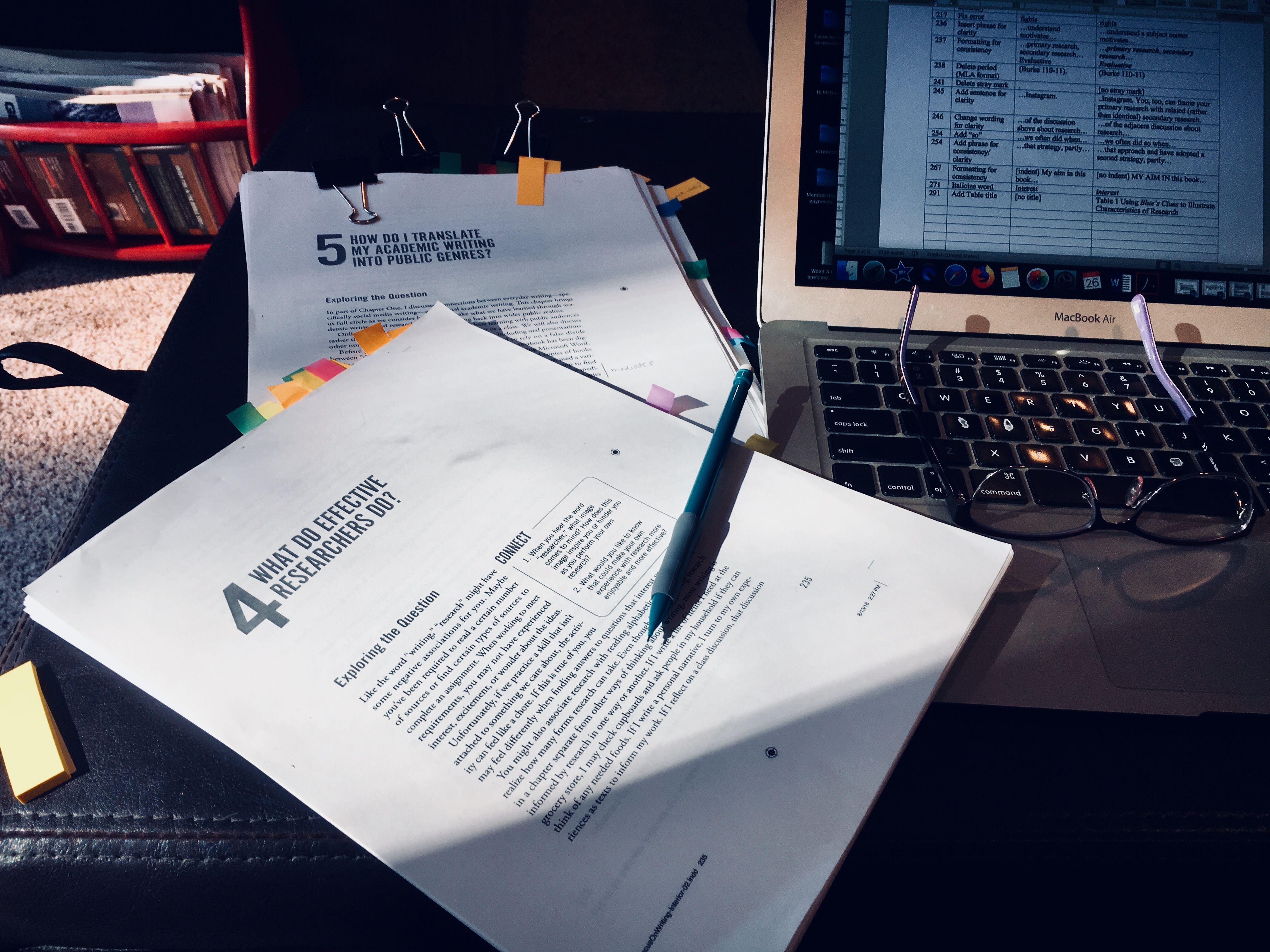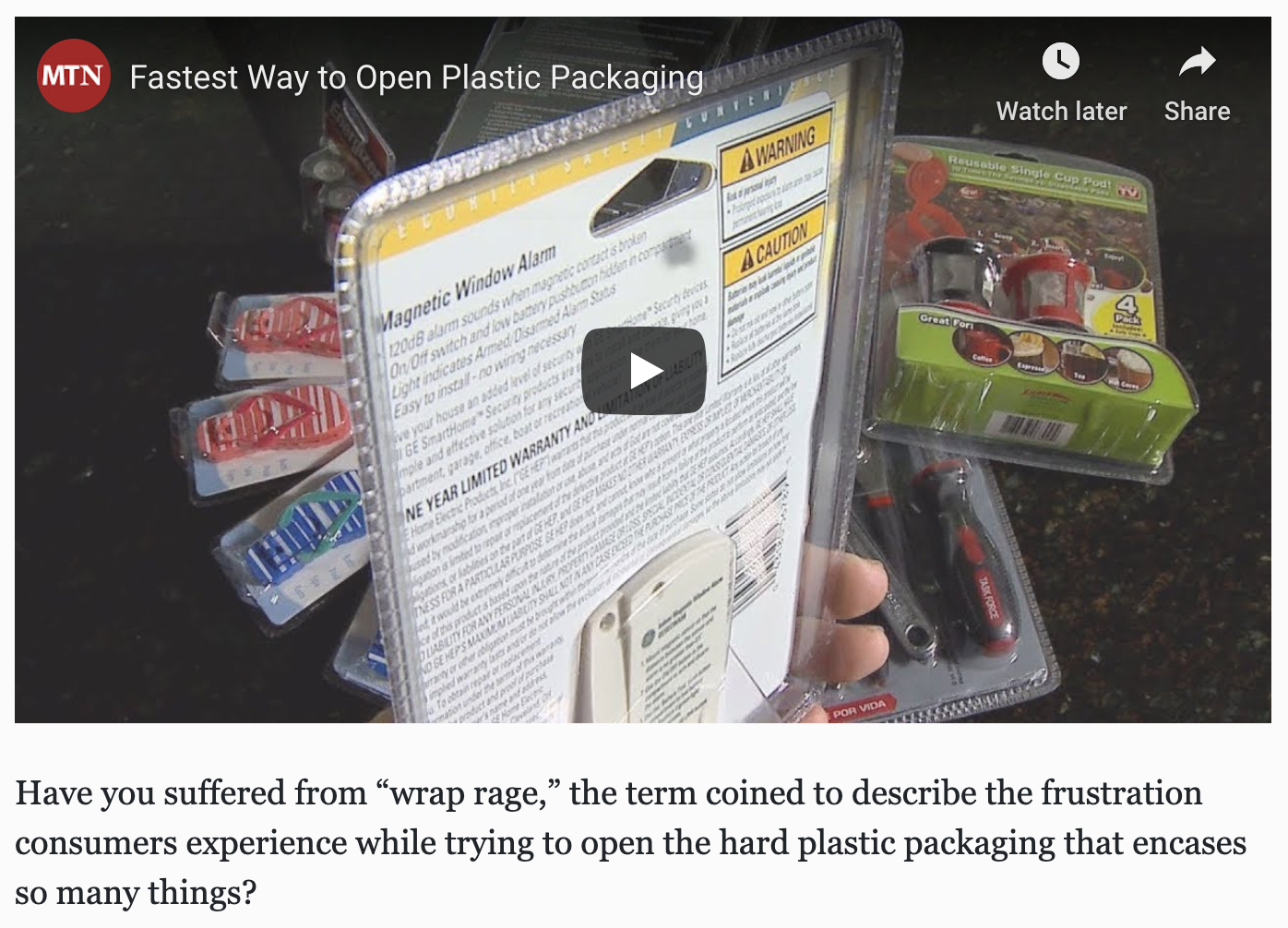poem!
disturbed
I live in metaphors
BEEP BEEP BEEP
at maybe 5am
waking me
the three smoke detectors upstairs screaming to one another
while I lay burrowed in blankets after too little sleep
from one thing or another having gone wrong the night before
The screaming ceases almost as soon as it begins
I close my eyes
think maybe that was a fluke
realize in two shakes of a lamb’s tail that
it’s more than a fluke because
they speak again
but then
blessed silence and
I snuggle back in ahhhh
and minutes until the next screaming bursts
two three do I need to get up then
silence
and hope and warmth nestled in and
again THE SCREAMING
THE SCREAMING SO LOUD
do I need to get up will it
stop will it just
stop do I have to
move and
silence
there’s no fire,
no one affected by the noise but me.
but I eventually give in to the situation,
venture from warm bed into cold house
pull a chair from one bedroom
into another bedroom
climb up pull the battery
out put it in again because
it’s a new battery so that’s
not the problem and grab
another chair for the hallway
detector do the same and
eventually crawl back
into bed where I
think about my tendency to
operate on hope for
a good long while when
I’m comfortable and would really
prefer not to give up that place of
comfort when no one else is
affected by the intermittent
SCREAMING that is not
comfortable at all.
How long does it take for me to believe
a problem will not go away on its own
to get up
to deal with it
to make the screaming stop
And how long will it take
for me to feel good again
when this morning feels terrible
Even though I slept well from 11:30 to 5:00
and overall
have an amazingly wonderful life
How long
***
I wrote that yesterday morning. I was SO cranky yesterday morning! But I felt better by the time lunch came around. So that’s how long it took to feel good again! lol
When I wrote the poem I was thinking about how I have a great capacity for ignoring the things that are problematic in dating relationships because it’s so inconvenient. It’s much easier to let them blow over and enjoy the good parts of the relationship, and I tend to operate too much on hope, as in, “I hope things will eventually get better” or “I hope the other person follows through on what we’ve talked about.” I’m trying to retrain my brain to pay attention to what’s actually happening instead of ignoring issues and relying on hope.
And then as I wrote it, or maybe when I was done, I was also thinking that the metaphor can be for all kinds of things that any of us can ignore because they’re inconvenient to think about. Maybe signs that we need to visit the doctor or make better choices for our physical health, or signs of climate change, or repeated instances of injustice. How long until we rouse ourselves to action? and, when we act, how long will we be in a state of discomfort before feeling good again?
Last note. I first wrote the poem on my phone yesterday morning, and then I removed all the line breaks before copying and pasting here last night (because copying and pasting into the WordPress format with line breaks is a Bad Idea–everything gets wonky). I added in the line breaks last night and fell asleep. This morning I adjusted a little but don’t feel wholly satisfied with the writing. It’s feeling pretty drafty. But I’m sharing anyway. Blog posts are for fairly informal writing, yes? Yes.
Oh! I lied. One more note. In a recent office conversation, my team was talking about the roles each of us plays. One person noted that when I see problems, I head into them instead of avoiding them. Sometimes my problem-solving ways are inappropriate, so I’m working on listening to people vent without trying to problem solve, and I’m also not trying to solve problems that are not mine to solve. But in general, my tendency to address problems is a good thing. And I tend to be good at stuff in the workplace before I’m good at it in my personal life. I won’t put up with screaming smoke detectors going off at work because that’s a terrible work environment for everyone.
I gotta value myself in similar ways, yes? Yes.

crocus
gray rainy day
meetings pull me from my screen from my clamoring inbox
move me from one indoor office space
outdoors
across concrete walkways and down chained sidewalks
head bent beneath my hood
beneath my exclamatory blue umbrella smattered with brilliant owls
to a conference room space
inside the administration building
horrid it all sounds horrid except that umbrella
horrid gray rainy meetings screen clamoring inbox indoor office concrete chained bent conference administration building horrid meetings meetings screen inbox meetings administration ugh ugh horrid ugh meetings screen horrid ugh
EXCEPT IT’S NOT
the balmy air
the connections the help the hard things with a gentle note the rallying the laughter the dark times the dark times together the stretching reaching the connecting the connecting
the bouncing between doorways in the sweet suite
the navigating
the firm path the guidelines the care of one another the crosswalks the clusters
THE CROCUSES
building as verb
meeting as verb
people around a table
a gray rainy day
pathways
bursts of yellow
something blooms
we take note
we return to the growing business at hand
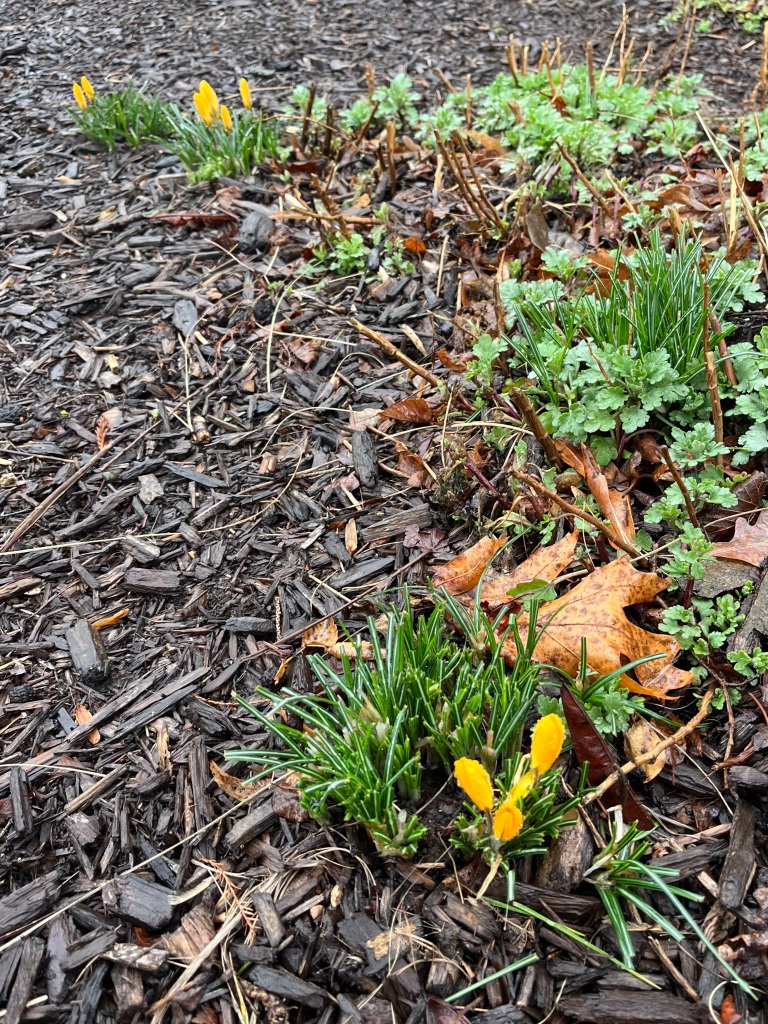
the moment before a crisis
Part One
What is that moment before the crisis?
that liminal space when all things are still possible
that moment when the cartoon character is not yet suspended in mid-air,
feet moving, expecting against the laws of physics to gain traction,
that moment when the inevitability of the fall is still
still
still
a footstep away?
That moment when staying on the cliff is scary,
when stopping running means facing whatever is chasing.
Part Two
The moment when the glass of milk is on the brink of falling from the counter
but my hand reacts before my mind does.
I grab it, perhaps more forcefully than what’s necessary, but it was on the brink.
It was! It was going to fall. I was so afraid it was going to fall.
You look at me, and we both look at the drops sloshed onto my hand,
the miniature pools of white on the counter,
the streaks still running down the glass,
the two tiny streams winding down the front of the cabinet and dripping
dripping
dripping
onto the floor.
My eyes meet yours. They scream for you to see what isn’t there
no sticky residue splattered in places we miss cleaning up
no encountering the mess gradually, over and over, in the next days and weeks
no milk soaked into the kitchen mat to sour and smell–almost imperceptibly at first–over time
no glass shattered and splintered where slivers would lodge in our food and our feet
cutting
cutting
cutting
our flesh inside-out and outside-in
slivers of glass too small, too numerous, too sharp to see or extract or prevent
No one dying of thirst because the glass of milk is gone, emptied, shattered, no longer here
Part Three
That’s all I’m talking about.
A glass of milk.
The edge of a counter.
The moment before the fall.
The hesitation, the action.
The small sloshing inconvenience and your accusing eyes.
The small sloshing inconvenience and the openness of the next moment
and the next
and the next
and the next
and the next
Or the other outcome:
the spilled milk
the shattered glass
the crying
the closing of possibility
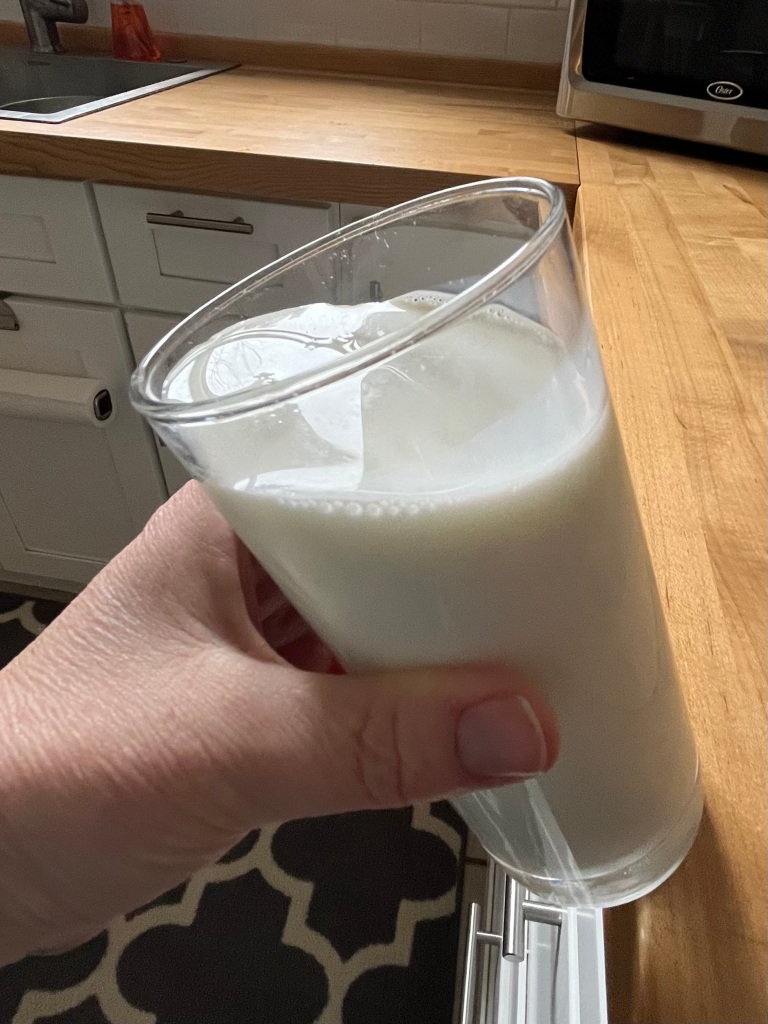
Morning: a poem
December 29, 2018
Nine days after holding my dog’s head and reassuring her with comforting words as the vet sedated and euthanized her
I have my list of Things-To-Do
Ways-to-Ignore-Things-To-Think-About
first thing in the morning,
but my laptop’s 44-minute restart compels me to change my plan.
I let the morning lead me.
An audio book on Libby, free from the Mid-Hudson Library System:
The Perfect Couple.
Three quarters of a chocolate chip muffin, a mug of maple brown sugar coffee,
children death marriage travel money college hope—
all in Chapter One
And seeking more activity so I can continue listening to the Nantucket-to-New York-to-Pennsylvania story
continue ignoring.
Ah: Sit-ups on the family room floor.
That will be healthy.
I face the glass doors to the back deck
so on each upward movement I can see the cloudy climes,
reward myself with sunrise-infused skies
as I welcome the ache of focused tension in my—
I first see the marks on the bottom of the glass door as a random design,
imagine the spray of glass cleaner, the swipe of paper towels,
and then. I know I am not ready to erase it,
these signs of Lilly’s dog nose, dog paws, seeking something,
relentless,
a pattern that compelled me to stop and open doors for this girl,
over and over,
no matter what else I was trying to accomplish,
even when she didn’t want to go out but really just wanted a treat.
The glass blurs more as goodbye tears—
at last—
arrive.
I still don’t know how to think, what or whom I mourn.
But I am compelled to honor Lilly’s life and my morning
(The Perfect Couple must pause)
with my own seeking marks,
my occasionally relentless nose and paws,
not knowing what I want,
but still hoping for a treat.

Nice and mean: Getting beyond what people think of me
I often fault myself for being too nice—for avoiding conflict and staying safe rather than calling people out when they’ve been inappropriate.
So I was a little taken aback when I received an email from a professional colleague whom I don’t know in person (I will call him “S.”) saying that I had made him cry when he read my “incredibly hurtful and mean spirited public attack” on another professional colleague (whom I will call “P.”).
Wow. I had been so harsh in my response to P. that I had made S. cry. Wow. And I had been that harsh in public. Wow. And I had done it in a professional setting—on a listserv populated by people I respect, people whose work has helped me and inspired me. Oh, wow. Oh, no.
***
What led to this moment? I participate in a professional listserv, the WPA-L, populated by college professors and grad students who teach and research and lead in the field of writing studies. You can check out the long initial thread if you want, but here’s my synopsis of my initial role in the listserv conversation.
- Three men mansplained a female colleague who requested sample rubrics. One of these men was P.
- That woman called them out on mansplaining, and 2 of the 3 men apologized. It clearly wasn’t intentional, so that should’ve been the end of the story.
- Then, P. mansplained again. After he had apologized. It was horrifying.
- I was angry. I answered that post-apology instance of mansplaining by using P.’s email to create a parody poem, using his words as a kind of template in case anyone had trouble identifying the mansplaining dynamics.
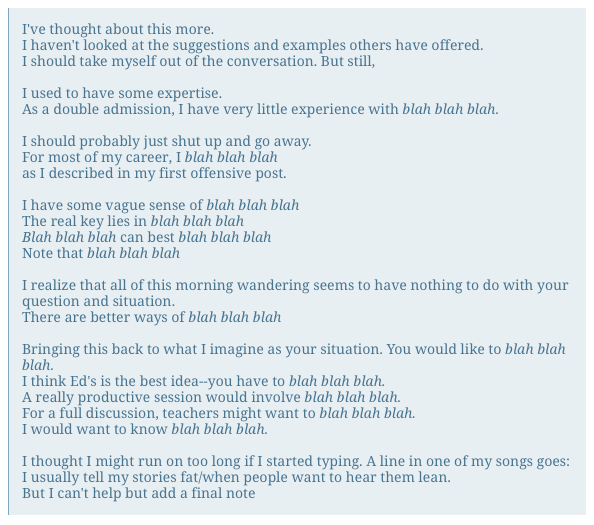
Many people responded to this found poem in positive ways. I’m childish enough and honest enough to admit that I found the positive responses gratifying. I had been a good feminist! I had been clever! I had stood up to the patriarchy! People I respect seemed impressed! Colleagues in my department seemed proud of me rather than embarrassed by me! What more could I ever hope for?!
But then, the thread about mansplaining went on and on, and in addition to S. emailing me privately to say he had cried in response to my mean spirited poem, several listserv posts referenced inappropriate / unprofessional / overly harsh responses to the mansplaining emails (and to P. in particular). I should note that P. is a very nice retired man who publicly and privately wrote that my parody poem did not offend him because he tries not to take himself too seriously.
Still, every time I read a claim that the responses to mansplaining were contributing to negative dynamics rather than addressing the problem productively, I thought,
I messed up the argument for all the other feminists. They are all writing these smart, coherent, well-reasoned arguments about mansplaining dynamics. But, because I wrote an angry parody, people are dismissing the entire conversation.
Ha! You can see that I sometimes believe I am the center of the universe, just like I sometimes believe I don’t matter at all.
Still, in the midst of ongoing listserv messages that spilled into multiple threads and simultaneous conversations on Twitter and Facebook, I didn’t have enough perspective to reflect in useful ways. I felt both pride and shame in that parody poem. I was used to being a not-good-enough feminist and a sneak-under-the-radar-where-people-might-be-more-likely-to-hear-me feminist by being too “nice.” I wasn’t used to being both a stand-out feminist and a ruin-it-for-all-the-more-rational-feminists feminist by being too “mean.”
I was uncomfortable.
***
Part of me wants to stop right here and say that a feminist may respond in a host of ways to moments or patterns of injustice, and no response is ideal. Any response may be read as “too nice” or “too mean” or “too blah blah blah.”
I could go on about that, or I could end with that point, but I have something more to interrogate regarding my discomfort. Until now, when anyone has brought up that parody poem, my response has been to answer with an expression of mixed feelings and a desire to spend more time thinking about it.
I’ll give myself a little bit of a break for claiming mixed emotions. I tend to measure the effectiveness of communication based on the fruits: Is the purpose met? is the job getting done? But any communication with multiple audiences becomes more complicated because the purpose may be met and not-met all at once. People who tend to be frustrated by mansplaining felt validated by my poem, and many laughed at a time when laughter was sorely needed.
Yet it seemed like people who didn’t recognize mansplaining prior to my poem were probably not suddenly enlightened but instead more resistant to noting such dynamics, so that’s a fail.
My mixed feelings are also based partly on my belief that it’s easy to rationalize being a jerk if I position myself as a kind of victim who’s reacting to a situation. I’m not interested in being a jerk.
***
But mostly I think my ongoing claim of “mixed feelings” is due to the uncomfortable feeling of being perceived as “mean” on the one hand and, on the other hand, feeling kinda smug about the positive responses I received.
Do you see how both responses—shame and pride—are rooted in others’ perceptions of me?
Of COURSE I would have mixed feelings when I care so much not just about the effect of the poem but also what others think of me. And, again, I find that I’ve positioned myself at the center of the universe. Egads.
So maybe I can see if I can make this not all about me?
***
When I think about the parody poem without caring so much about what people think of me, I get a little mad about some of the reactions.
Why did S. contact me with so much concern about P. but no concern over the woman whom P. had mansplained—in a public forum, where her colleagues and students could witness the demeaning way she was spoken to, not once but twice? Why did others on the listserv call out uncivil behavior in the responses to mansplaining without recognizing that the mansplaining at the root of the conversation was itself rude and inappropriate?
So this is where I’m ending up. Once I let go of concerns about what people think of me, I feel really good about that parody poem. Yes, it was written in anger, but it did what it was meant to do: It used P.’s own words to expose the incivility and condescension in his message. And it did it in a way that was not so much about P. as it was about a speech pattern that negatively affects too many people (mostly women and others in vulnerable positions) all too often.
Those who didn’t (couldn’t? wouldn’t?) hear the message are invested in a worldview that protects P. (all men? certain men with secure professional standing? P. in particular?) and his reputation. These folks are thus not able to hear any message that calls P. (or men in general?) to account for writing in disrespectful ways to others. If these folks were open to hearing rational arguments, they could’ve heard the rational arguments and ignored my angry parody.
Yes, they will say that P.’s intentions are good. I believe that. And if the situation had ended with the apology, there wouldn’t have been a parody poem and a public reckoning. But intentions, hell, etc. If P. (or anyone, because we are talking about patterns…) is not willing to learn and adjust communication even immediately after apologizing, well, let’s spend time worrying about the people victimized by good intentions.
So that poem isn’t about me being a cool feminist or me being a mean jerk. That poem is about a problematic dynamic—mansplaining in professional spaces—that we need to recognize and change.
I’m owning it. I wrote that parody poem. I posted it to the listserv. It made some people uncomfortable, including me.
The question is, what do we do with our discomfort?
If you’re at all like me, you’ll look at your discomfort, see where it’s coming from, and decide how to move forward.
(Or if you’re at all like the less mature side of me, you’ll either run and hide from your discomfort or lash out at whatever seems to be the immediate cause of the discomfort. But let’s try not to be like that less mature Laurie!)
In my case, seeing my tendency to care too much about how others perceive me allows me to shift my focus so that the poem I posted is not about me but instead is about a communication dynamic. I can use my discomfort as an opportunity for growth. I need to decenter myself.
I’m actually laughing now because I’ve written an entire blog post about my perspective in order to reach the conclusion that I need to decenter myself. Ah, the irony. But I’m going to share this anyhow because even this story is not so much about me as it is about patterns. Maybe in the future I’ll be quicker to recognize my tendency to care too much about others’ perceptions of me. Maybe others will see similar tendencies in themselves.
Maybe we will be quicker to acknowledge our feelings of shame and pride and then let those feelings go as we turn our attention back to the good fight.
proofs
the strange satisfaction in cataloguing changes
moving through pages with purpose
cleaning deleting inserting trans-
posing moving toward geometric clarity
and perhaps once adding a phrase
because a sly joke was necessary
with apologies to the typesetters whose
lovely pages I’ve probably thrown off—
please understand, there’s no point making pretty pages, joining
orphans with parents and widows with spouses, unless
we find a bit of joy, a touch of connec-
tion, as we spend time immersed not just in the marks on the page
but in the trees and people and hardware software circuitry
crackling electricity bringing
the book to life
